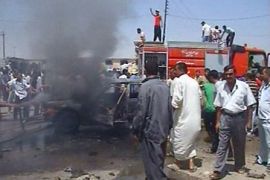What future for Iraq?
Al Jazeera asks experts and politicians how they would resolve the Iraq conflict.

Al Jazeera asks experts and politicians for their solution to the conflict in Iraq
| ||
Laith Kubba, former Iraqi government spokesman
“I would argue that what Iraq needs today is the equivalent of the type of conference that ended the civil war in Lebanon, where you bring the three major players – Turkey, Iran and Saudi Arabia, as well as Syria, Jordan and Kuwait to a round table with Iraqi leaders and, of course, with the support of the US and Europe – to work an agenda on how to rebuild Iraq. This has not been done yet for political reasons, but I think that’s the only untapped potential we have ahead.”
| ||
Mustafa Alani, security analyst, Royal United Services Institute (Rusi)
“You cannot put democratisation before security and stability and we discovered in Iraq that you cannot have democratisation at the same time as security and stability. So my idea is basically to cancel the whole political process [since] 2003, start from the beginning and give power to a new government and cancel … the constitution and … start from zero.”
| ||
Harith al-Dhari, Muslim Scholars Association
“The problem is the occupation – the occupation is aimed at destroying all of Iraq and fragmenting it. If the occupation ends, then the problem will begin to unravel, so the occupiers need to leave Iraq immediately. Then Iraqis will be in charge of their own affairs, as it used to be in the past. As for those who think the occupation forces are the safety valve and their departure may lead to a security vacuum and cause a civil war, I don’t agree with them. If the occupiers don’t like such a quick withdrawal, they should do it in a way they think appropriate or as some call it, [in] a way to save face.”
| ||
Rosemary Hollis, Middle East analyst, Chatham House
“Were the Americans to pull out in a hurry, there would be a lot of very angry Iraqis [who would say] ‘you came here, you messed it up completely and now you abandon us’. However, I don’t think Bush is going to leave in a hurry. He wants to stay the course, as he puts it, and we may even be looking at an outright confrontation between the US and Iran over the future of Iraq and Iran’s role in the region. So the only way around all of this is to include not only the Americans and Iran in discussions on the future of Iraq but all the neighbours and all the main factions.”
| ||
Saad Jawad Qandeel, Supreme Islamic Council in Iraq
“The solution is really for the Iraqi forces to reconcile to work together to try to find a way out themselves, and if they agree with each other, it’s very useful and if they don’t, then no other country, neither America nor any other country, could [create] a solution for them.”
| ||
Michael Williams, security analyst, Rusi
“I don’t think a unilateral withdrawal is at all responsible [of the US]. Certainly if the US is going to start to reduce its troop commitments, it needs to do so within a wider regional framework. Iraq is going to have a very long, hard and difficult road ahead whether the US stays or goes and if the US chooses to leave prematurely, then it really needs to make sure that it brings in the surrounding states to have a regional discussion about what the US will be doing and what their role will be in maintaining stability in Iraq.”
| ||
Abdul Wahab al Qassab, defence analyst
“The main problem in Iraq is sectarianism. The religious factor is playing negatively in Iraqi political and social life. Getting rid of this would deal with sectarianism. Iran is meddling in Iraqi affairs heavily. The bonds of the downstream support to the militias who used to come from Iran to Iraq need to be cut.”
| ||
Munzir Suleiman, strategic affairs analyst
“The first step is for the US to declare its intention to withdraw and to negotiate how to withdraw. That will entail a ceasefire with the resistance and a process that would involve the United Nations, the Arab League and the Islamic countries to have a transitional period that, supervised by all those elements as some kind of combination [in a] truly a regional and international solution.”







